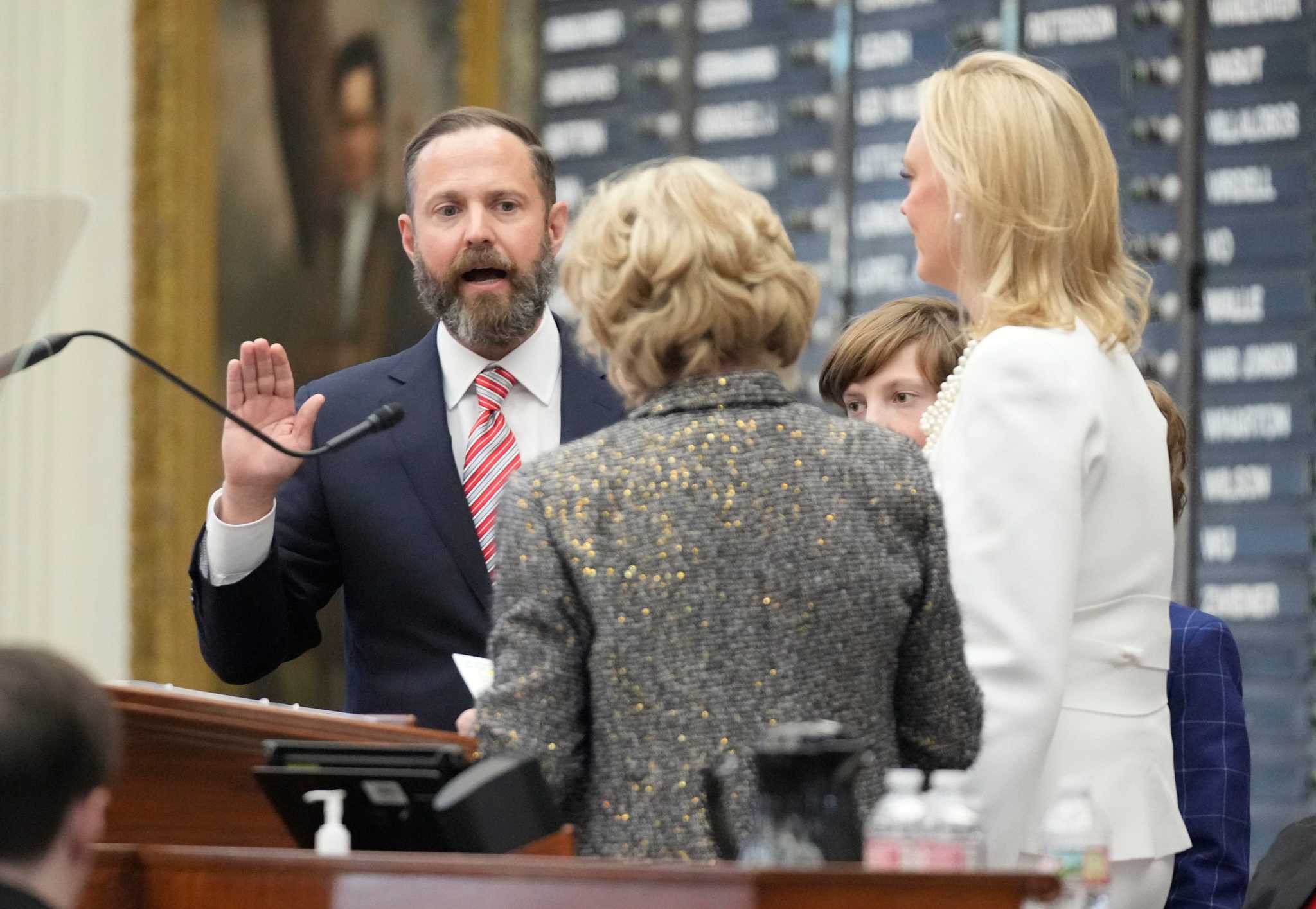politics
Texas House: Speaker race in rear view, committees can now get to work
With the Texas House legislative committees filled out, the stage is now set in the lower chamber for legislators to get to the people's business.
Published February 16, 2025 at 12:02pm by John C. Moritz

Lawmakers converse after House committees assignments were given on the floor of the House of Representatives at the Texas Capitol at Thursday, Feb. 13, 2025.
Mikala Compton/American-Statesman
The drama heading into the Jan. 14 opening of the 2025 legislative session was all about who would win the bitter and unusually public battle for Texas House speaker.
But once the race for the chamber's chief was settled, the speculation swiftly turned to who the new speaker — Lubbock Republican Rep. Dustin Burrows — would appoint to which committees. And more importantly, who would be named to committee chairmanships.
Rep. Dustin Burrows, R-Lubbock, takes the oath to be speaker of the Texas House on Jan. 14, the first day of the 89th Legislature, after an unusually public battle over the speakership among the Republicans.
Jay Janner/American-Statesman
The questions, before the speaker put the matter to rest when he announced his choices Thursday, were: Would Burrows reward his supporters with influential and powerful assignments? Would he relegate those who had opposed his election to the back benches where they and whatever bills they might hope to pass would languish until the session ends June 2? Would Burrows make nice with his political enemies, and what would they have to do to get out of his doghouse?
On its face, all this might sound like the angst you'd find among high schoolers sitting around the tables of the cafeteria. And truth be told, there is an element of that. But in fact, the assignment of committee members and the lawmakers who chair the panels does have an outsized effect on how the remaining 105 or so days left in the legislative session will play out and on which bills will pass or die.
Here's how the Legislature works: As many as 5,000 bills get filed in any given legislative session, and lawmakers only get 140 days every other year to act on them. It stands to reason that a healthy number of the proposals are doomed the day they are written.
The ones that have any chance of advancing must find their way to a committee that is chaired by a lawmaker who is predisposed to support them. And even if a committee chair does like one bill or another, it takes a majority of the panel's membership to send it to the next level. So even if a chair does like a bill, he or she typically has little interest in wasting a committee's time on it if the rank-and-file membership isn't going to advance it.
Another important aspect about committee assignments and chairmanships is their reach beyond the walls of the Capitol. For instance, if a member is assigned to a committee with jurisdiction over an influential industry or trade group, that member has an instant fundraising base. Interest groups have a, well, interest in maintaining a good relationship with lawmakers who can affect their livelihoods.
Rep. Briscoe Cain (R-Deer Park) and Rep. Todd Hunter (R-Corpus Christi), back, react as House committees are assigned on the floor of the House of Representatives at the Texas Capitol at Thursday, Feb. 13, 2025. Cain will be on the Agriculture and Livestock committee as well as the Delivery of Government Efficiency, or DOGE, committee.
Mikala Compton/American-Statesman
They have an even deeper interest in staying in the good graces of whoever is chairing the committee that gets to poke its nose into one group's or another's business.
In looking at the reward and punishment part of the committee equation, it has long been accepted as a given that members who openly oppose any given House speaker can expect few, if any, favors to come their way. The 2025 session put a bit of a wrinkle in that truism.
First, starting back at least two years ago, the Republican grassroots and more than a few GOP elected leaders made clear they were fed up with the long-held House tradition of awarding committee chairmanships to members of the minority party. And, when this session began, the House adopted a rule saying Democrats may not chair standing House committees. Period. End of story.
The challenge for Burrows was that more than 55 of the 88 Republican House members wanted someone else to be speaker. And because the House has about 30 standing committees and a dozen subcommittees, there just aren't enough Republican supporters of Burrow's speakership who have the needed experience and institutional knowledge to chair all those committees.
So, Burrows used a workaround by giving six Democratic members subcommittee chairmanships. And he also awarded chairmanships to a handful of supporters of his rival, Rep. David Cook, R-Mansfield. Cook received a subcommittee chairmanship. Under the new House rules, Democrats got all the standing committee vice chairmanships.
Part of the upshot to this round of committee appointments was that not every House member and every interest group was completely happy with how it all turned out. But that's the upshot of every round of committee assignments.
Perhaps the more significant takeaway is how little public grumbling there was after the House adjourned Thursday for the long President's Day weekend. And when House members return to the Capitol on Tuesday, the business of setting the past drama aside and putting the committees and their members to work will begin in earnest.

